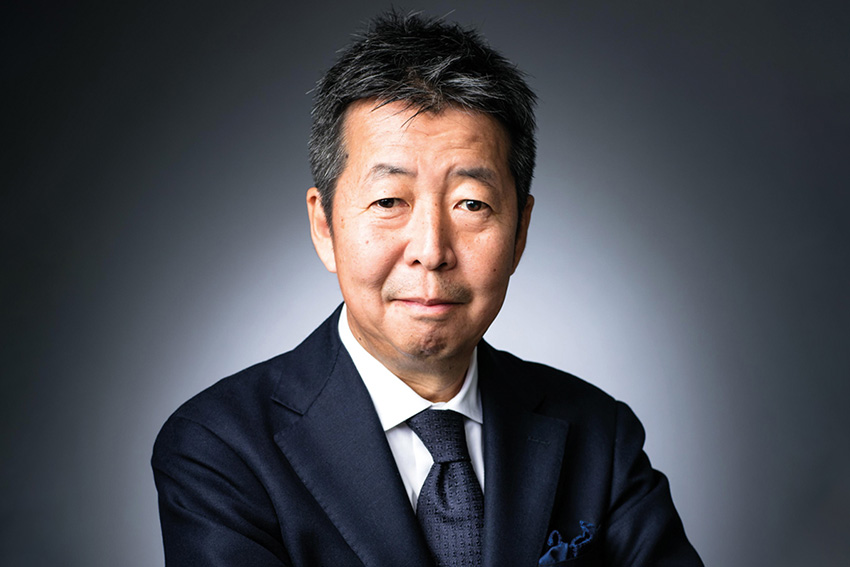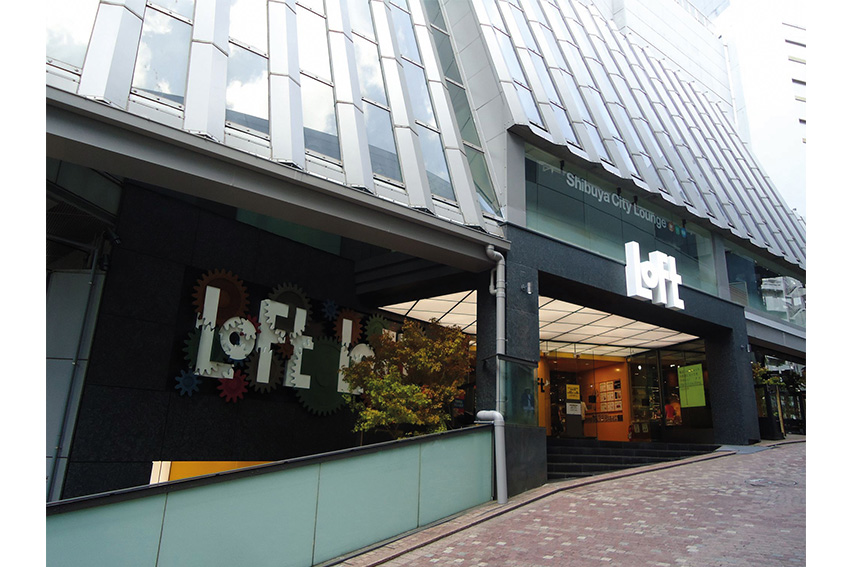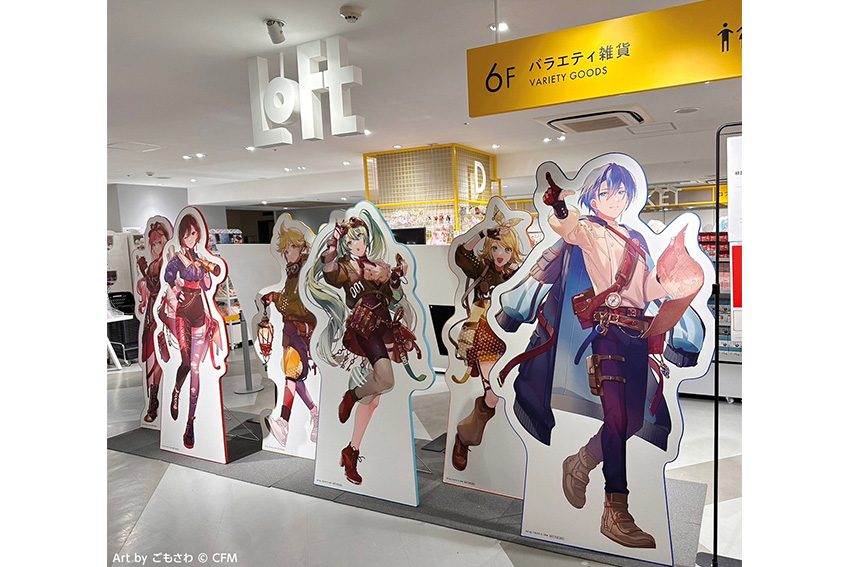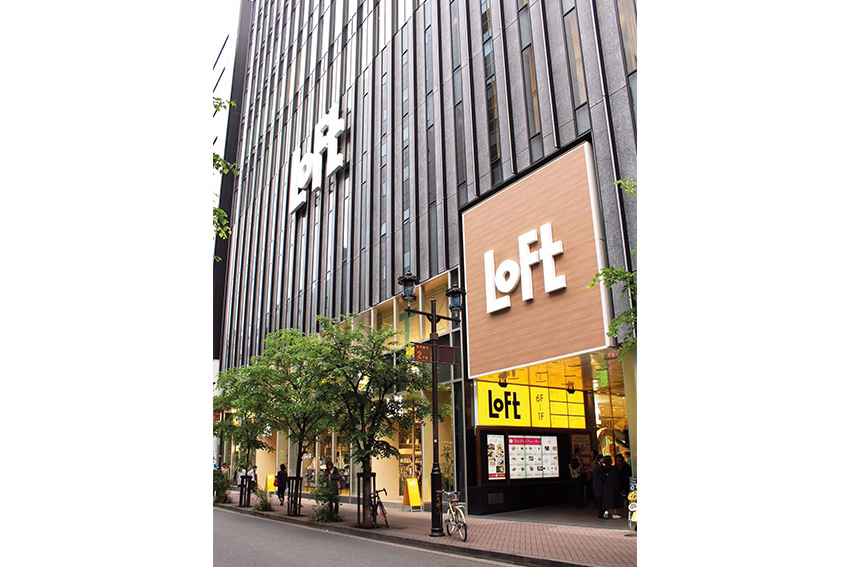In an exclusive interview, LOFT's president discusses navigating economic fluctuations, embracing cultural shifts, and unveiling strategic initiatives to secure long-term success in the dynamic retail landscape.

The Japanese retail industry is living in an interesting time right now due to the weakened JPY, growth in inbound tourism, and tax reductions, and as such, Japan seems very attractive on the international scene regarding household items. Tourists may take advantage of the situation to bring back high-end unique items from Japan. How do you feel about these trends, and what business opportunities do you see as a result of the current economic environment?
Japan is traditionally known for its safety and security. Furthermore, tourists often talk about how safe and clean Japan is, with beautiful scenery and delicious food. In fact, Japanese food culture is beginning to spread around the world. In the days before the novel coronavirus pandemic, inbound tourism increased significantly, but the spread of COVID-19, which began in March 2020, has hit inbound tourism hard, and for the last three years, it has remained below the level before the pandemic. The number of inbound tourists has been severely impacted by the COVID-19 outbreak. Fortunately, since July 2023, tourists have surged again, surpassing the numbers seen in 2019.
In fact, LOFT marked a new record high in inbound sales of approximately 500 million yen in December 2023 due to growing inbound tourism. These numbers were boosted by the depreciation of the yen, which increased to 113.6% in 2023 when compared to 2019. The reason these numbers have exceeded is that although Chinese tourists did not return, the increase in tourists from Taiwan, South Korea, Hong Kong, and the U.S. from October 2022 onward contributed more than making up for the decline of inbound from China.
With the Chinese New Year coming up in February, our expectation is that inbound tourists from mainland China will also return. Of course, you mentioned the weak yen, and that is one of the biggest reasons for the surge in tourists. However, the types of activities that tourists engage in have changed compared to pre-Corona. This is especially true for consumption habits. Prior to the coronavirus, an increasing number of Chinese tourists were purchasing pharmaceuticals and home appliances made in Japan. After the COVID-19 pandemic, tourists seem to have shifted their interest to the latest trends in Japan and products that are popular among Japanese people, and “Bakugai,” a bulk-buying shopping spree in a specific category, has faded. In addition, inbound tourists are becoming more invested not only in the accommodations where they stay but also in the experiences they have here.
Here in Japan, the number of children is declining due to population issues, and therefore, the Japanese market is shrinking. This means that inbound tourism is also something we need to strengthen.
Our assortment is not solely focused on price, but we always aim to introduce products that will inspire our customers. LOFT is known as a place where people are excited to store, some come to buy products, others to enjoy the atmosphere and learn about the latest trends. Some come to LOFT to find a gift for that special someone. We want to continue to appreciate these impressions and their value. At the same time, we are constantly updating to the latest duty-free system for inbound tourists.

You mentioned the population dwindling, and we know that Japan is the oldest society in the world with a rapidly declining population. In fact, experts are predicting that the population will drop to under 100 million by 2050, with one in three people over the age of 65. This is causing a number of issues, including a labor crisis and a shrinking domestic market. Having said this, how is your firm reacting to these demographic changes, and to what extent do you need to look overseas to ensure long-term business success?
LOFT operates approximately 160 stores in Japan, with sales revenue of approximately 115 billion yen in 2023. The most profitable store style is what we call "standard stores," which are 1,000-square-meter stores located in commercial facilities. Currently, we are opening about 10 or more new stores on an annual basis, and this trend will continue through 2030. We have a medium-term plan from 2026 to 2030, in which we target sales of 150 billion yen. Operating income is 5%, equivalent to about 7.5 billion yen. Our medium-term strategy is to increase profits by opening a large number of highly efficient stores, but after 2030, I believe we may shift to a more stable course, emphasizing quality over scale through scrap-and-build.
While the focus of our stores is on our employees, what we want to do is to focus on the well-being of our customers, suppliers, shareholders, and local communities, and to create a situation that is advantageous to all five parties (gohoyoshi).
As for overseas expansion, we currently have four stores in China, including three in Shanghai and one in Sichuan Province. In Thailand, we used to have four stores, but after the Corona, we reduced the number to two.
Our business model is an NB-assortment business model, not an SPA-type business model with own-brand products like MUJI or UNIQLO, which is a business model that is difficult to succeed in overseas markets. We experienced particular difficulties in opening our first store in Shanghai. It opened at the end of July 2020, in the middle of the COVID-19 pandemic. Subsequently, a zero corona lockdown was in place in China, and we struggled to get support from Japan. Recently, we have witnessed a resurgence in the Shanghai retail market. China's fiscal year runs from January to December, so looking back to 2023, in fact, two of our three stores in Shanghai have achieved their target numbers.
In Japan, LOFT's strength is in health and beauty sundry products, but in China, health and beauty regulations are stricter than expected, and we are currently handling the following intellectual property (IP) products in China. We also incorporate local products in China such as character sundries and stationery. With local and IP products, we have a stable foundation to achieve our sales targets.
You mentioned the four stores in China and the two stores in Thailand. Looking at the future, are you looking to open any new stores? If so, what markets or regions do you believe are good locations?
We would like to open new stores by finding a balance between directly managed stores and franchise stores. As for directly managed stores, we are aware of the possibility of opening stores in other cities in China. We have also received requests from several companies for franchise stores, and given the vast size of the country, we feel it is necessary to consider this option.
Earlier you mentioned targeting inbound tourists, and I think that when tourists come to Japan shopping in massive stores like yours is part of the fun. Some companies have been able to position themselves very well in this regard, take Don Quixote for example. It is cheap and very messy, and you will find everything from food to electronics. How would you like to position LOFT? What would you say is the unique selling proposition of LOFT shopping experience?
When we established the first LOFT store in Shibuya, we took a cue from Tokyu Hands, which was a leading general merchandise store. We opened the first LOFT store with the aim of taking a unique position in relation to Tokyu Hands, a purpose-driven store where customers come to purchase items with a purpose. We wanted to position our store as an entertaining space where customers could enjoy adventures and experiences with a sense of anticipation of "what's out there and what's sure to be out there." This is why we defined our store as a time-consuming store. Tokyu Hands was strong with men, and in contrast, LOFT aimed to be a store strong in personal gifts, with women and the younger generation as its main target. By creating such uniqueness, we are differentiating ourselves as a unique store that cannot be found anywhere else. We believe that these factors will allow inbound tourists to determine where they want to shop and whether they want to shop at LOFT.

Your firm’s uniqueness definitely comes from your ability to expose trends and attract customers to buy them. Buying on impulse creates a stronger emotion and thanks to your well-designed space is essential considering the high volatility of these trends. Unfortunately, however, this volatility can act as a double-edged sword since it requires you to always be on top of these trends and have your finger on the pulse of the newest trends before anyone else. How do you overcome these challenges and ensure that your company and shops remain relevant? How are you able to manage your stocks in an efficient way to avoid overstocking in case a trend dies out much sooner than anticipated?
LOFT's first flagship store was established in Shibuya in 1987, but the brand itself originated in the Seibu Department Store. We became an independent company in 1996 as THE LOFT CO., LTD. and since then we have maintained good relationships with our suppliers and provided valuable products to our customers.
More than 1,000 companies supply us with merchandise, and our top 150 suppliers account for 80% of our revenues. We are always on the lookout for the latest trends and currently have 200,000 products in our assortment. Of these 200,000 items, about half are replaced and updated each year.
The flagship store in Ginza has about 55,000 products, and the Shibuya store has about 70,000 to 80,000 products. The 1,000-square-meter store with the largest store number offers approximately 20,000 items. We check sales trends and stop stocking products that do not sell after a certain period. We also have an inventory distribution system that allows us to identify which stores are selling well for a particular product and move product inventory to stores with better sales potential. Approximately 800 million yen worth of products are distributed between stores. Twice a year, we also hold a "yellow bazaar" in which stores sell surplus inventory at reduced prices. We have also begun to donate some of the excess inventory through local governments. The goal is to sell out, but the return rate is about 4%.
Your company recently engaged in some strategy programs you are calling LOFT Way and LOFT Next. LOFT Way focuses on enhancing workflow and providing the best and most unique experience for your customers. LOFT Next represents all of the initiatives you would like to put in place to differentiate yourself. Why did you feel the need to create such strategy programs, and moving forward what innovative solutions or products would you like to introduce to surprise your clients and improve your business?
The LOFT Way represents a very basic concept of our business operations. Even in the days before the new coronavirus, with the advent of Internet shopping, we needed to find the value of shopping in physical stores. Since we work with so many national brands, it is important for us to find solutions to get customers to come to our brick-and-mortar stores. The first thing I did was to create a reason for them to come to our physical stores. We have been using online channels such as the LOFT app and website to communicate information about seasonal and character events to encourage customers to visit our actual brick-and-mortar stores. To facilitate this, we have provided training to our employees on information dissemination for the past 8 years.
We also offer visual merchandising (VMD) training, with lectures by VMD specialists on how to create attractive displays and displays. Based on their experience, staff also learn new ways to appeal to customers through channels such as Instagram, Twitter, and the LOFT app. Thanks to these activities, we have been able to increase the number of VMD specialists in our company.
Every year, we hold a cosmetics festival not only in spring and summer but also in fall and winter. We invite approximately 600 guests, including heavy users of the LOFT app, influencers, and media representatives. The latest cosmetic products will be displayed and explained to the invitees. This is a measure to ensure that people attending the exhibition learn about the latest and greatest products and spread information about them. This leads to actual store visits and product purchases.
The concept that has guided us at LOFT since our founding is “TOKINOUTSUWA” (Showcase of the Times). This means to propose new lifestyle ideas in response to the ever-changing times. We must always keep abreast of people's lifestyles and the latest trends.
Men's cosmetics have been a trend for about three years, and we have as a matter of fact held a cosmetics festival for men, but recently we have changed the content and name to a genderless cosmetics festival to dispel stereotypes and meet the needs of the times without being gender-specific.
In addition, Korean cosmetics have become extremely popular in Japan in recent years, with sales of Korean cosmetics at LOFT reaching 9 billion yen in fiscal year 2023. One of the two "Cosme Festival 2024SS" to be held this spring will be dedicated to Korean beauty.
Going forward, we intend to brand ourselves as a company that essentially produces a culture of curated sundries. Specifically, creating a culture of curated sundries means not only selling products made by suppliers but also that LOFT staff would like to work together to create things.
Currently, we are working to create a new business model in collaboration with manufacturers and intellectual property (IP) rights holders such as Japanese musicians, manga, anime, and video games. LOFT will discuss with IP rights holders and manufacturers what kind of products would be best suited for production and connect IP rights holders with manufacturers to create unique products for sale.
Another pillar we are trying to nurture is the BtoB branding business. This is due to the growing recognition of LOFT's product planning and development capabilities and product connoisseurship, and we are using its brand power as credibility and sales appeal to corporate customers, leading to business negotiations with major Japanese beverage manufacturers, the education industry, sports business, and other businesses.
In addition, we are promoting the development of multiple "Cosme LOFT" stores, a new type of store with a floor space of 100 to 120 square meters.
So far, we have launched six of these mini-stores, and we aim to further expand the number of stores in the future. Regarding overseas store development, our immediate goal is to achieve stable growth in the Chinese market. In fact, our next-generation goal is also to have a store in New York City.
Other business activities include the operation of the MoMA Design Store in Japan and a business alliance with Sotokoto, a publishing company that has been launching social and environmental activities, to promote regional revitalization in Japan. In addition, under the project name "Zimoto LOFT," local LOFT in each area holds pop-up store events from time to time to highlight local products and makers, in conjunction with the local government.

Imagine that we come back in five years and have this interview all over again. What goals or dreams would you like to achieve by the time we come back for that new interview?
I became the fourth president of the company in 2016, and from 2016 to 2020 was the first mid-term plan under my leadership. Currently, our mid-term plan is underway from 2021 to 2025, and our next mid-term plan will be from 2026 to 2030.
Our company continued to grow from 2017 to 2019, but in 2020, due to the impact of COVID-19, operating income fell into the red for the first time. At that time, only a limited number of stores could remain open, and many had to close temporarily in April and May 2020. Our brand was not a necessity for our customers, so we could only operate through the e-commerce channel and fell on hard times. To be honest, during the pandemic, we even felt we could go out of business. However, we came to the conclusion that if we became the number one company in this field, we would be able to survive even if the market shrank. This was the basis of our mid-term plan for the period from 2021 to 2025.
Although FY2020 was our first loss since the founding of the company, our mid-term strategy called for a recovery from the loss by the end of the plan. Fortunately, we returned to profitability in the following fiscal year, FY21, and the current plan was more profitable than expected with two years left in the plan. In FY23, inflation drove up the amount spent per customer. In addition, last summer was extremely hot, and heat-related items performed well. 2023 operating income is expected to be the highest in our history. However, from FY2012 onward, we will shift our focus from this rapid V-shaped recovery to a path of stable growth and work to increase LOFT's corporate value beyond simply maximizing sales and profits. Based on the Purpose of "creating new lifestyle value through the power of sundries," we aim to become a "100-year company" that realizes our vision of becoming a "producer of sundry goods culture," and as a result, we target sales of 150 billion yen, operating income of 5%, and operating income of over 7.5 billion yen by fiscal 2030. As a result, we aim to achieve sales of 150 billion yen, operating income of 5%, and operating income of over 7.5 billion yen by FY2030.
0 COMMENTS